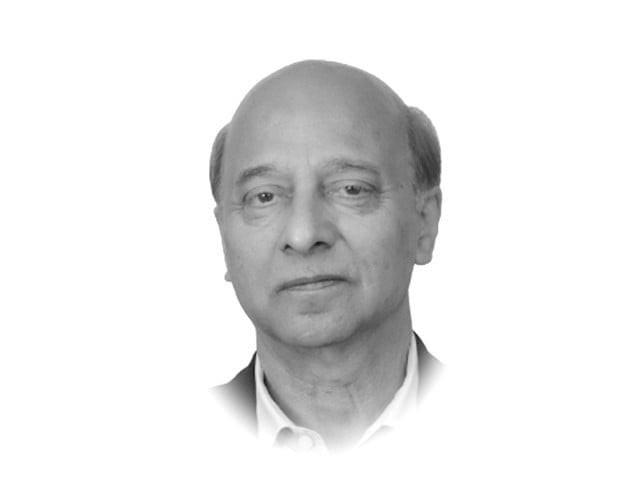The two CEOs
CEO of Supreme Court and of the Country face legal and political scrutiny over performative discrepancy

This column relates to two critical issues that revolve around two chief executives: one is the CEO of the Supreme Court and the other is the CEO of the Country.
The former is under public and legal scrutiny for apparent discrepancies between what he used to stand for and what he says today. And this issue is directly linked to the quest for an independent judiciary and the divisions within the institution on how to firewall external pressures.
The latter is reflective of the short-sighted, self-serving and reckless political leadership that has piled misery on the people of Pakistan for decades and yet is promising revolution through good governance. The reference here is Prime Minister Shehbaz Sharif’s latest pearls of wisdom that he showered on Pakistan at the recent World Economic Forum (WEF) held in Saudi Arabia.
As May 9 approaches, images from the Islamabad High Court and elsewhere on that day will flash back into memories. The events led to the institution of hundreds of cases against former prime minister Imran Khan, his aides and a number of workers as well as several innocent onlookers. The ensuing convictions of Imran Khan in the Cipher case and Iddat case (the latter being an absolutely private matter between two adults) and the endless course of litigation took the farce to new levels. Equally farcical is the Al-Qadir Trust case where the former prime minister is being tried for misappropriating 190 million pounds which are sitting in the Supreme Court account. The land under question is in the name of the Trust. Imran Khan by no means is the owner of the land.
This case alone should have forced the CJP to invoke Article 184-3 and challenge the National Accountability Bureau (NAB) proceedings against the former prime minister. But he continues to duck under excuses, not ready to admit external interference or pressures on the judges for extracting favourable decisions. Has the Chief Justice increasingly isolated himself by refusing to admit the pressures and persuasions various levels of judiciary have been facing all these decades?
It is meanwhile abundantly clear that complaints by the six judges of the Islamabad High Court — emphatically endorsed by the Peshawar, Lahore and Balochistan High Court justices — were a direct consequence of the February 8 elections and the mauling of the results. The fraud committed on Form 45 and consolidated through Form 47 were obviously meant to deny the largest party its due place in national and provincial parliaments. The Supreme Court was equally culpable in the scheme after it deprived the PTI of its election symbol.
A lot has been written and spoken about all this, but is being recapped because the Chief Justice and like-minded judges seem to be mired in a state of denial — willfully or otherwise. Many of Justice Isa’s observations during the April 30 hearing on the Islamabad High Court judges’ letter made him look like an alien — as if he never lived in Pakistan.
Justice Isa did adjudicate the Faizabad Dharna Case in which he held ISI chief and others responsible. He did apologise for Zulfikar Ali Bhutto’s “judicial murder” via the Supreme Court.
How can he now pretend innocence by saying there has been no external interference or pressure ever since he took charge in April 2023? Doesn’t he see enough evidence in how the fundamentals of justice were mauled in Cipher and Iddat cases by people who by implications are subordinates to the Supreme Court?
Now let’s consider Shehbaz Sharif — the CEO of the country. Addressing potential investors and economists, the premier in his wisdom chose to lay bare the evils that reside in Pakistan: the power sector is in a shambles, electricity theft is rampant, and the elites of the country are getting perks/privileges that they don’t deserve.
He pretended to be candid but his candidness amounted to telling the foreigners that Pakistan is a mess, don’t think of investing in that country where the electricity is stolen and the ruling elites are extractive.
One wonders whether the PM was in the right frame of mind at all. Imran Khan used to say similar things at home and abroad. And all Sharifs, Zardaris and their associates accused him of bringing them all in disrepute by calling them thieves.
Does the PM come across as a credible man who has nothing to do with the current mess and wants a revolution in the country? Investors do a bit of due diligence before even thinking of parking their precious money in a country. In our case, it is Sharifs and Zardaris plus close associates in key positions — the country is in the stranglehold of two clans and the establishment. Can that really excite investors to give it a try in Pakistan? Perhaps the Saudis and Qataris would buy off farm lands to ensure their own food security. Will it elevate this country of 240 plus million to a regionally competitive level? Will that be enough to take care of the crippling external loans and the crushing power sector circular debt? Both are a noose around Pakistan’s neck which it won’t get rid of through mere agriculture farming for a few countries.
Published in The Express Tribune, May 4th, 2024.
Like Opinion & Editorial on Facebook, follow @ETOpEd on Twitter to receive all updates on all our daily pieces.
















COMMENTS
Comments are moderated and generally will be posted if they are on-topic and not abusive.
For more information, please see our Comments FAQ